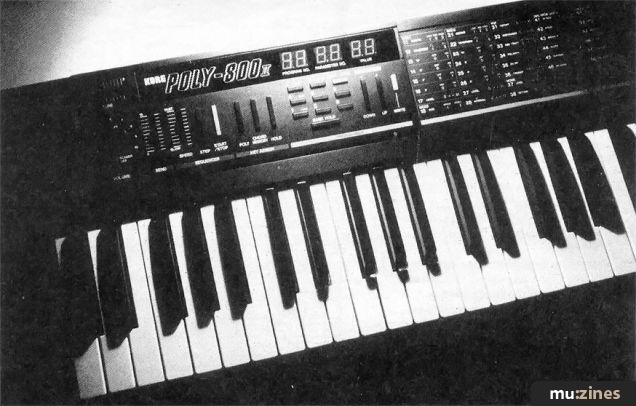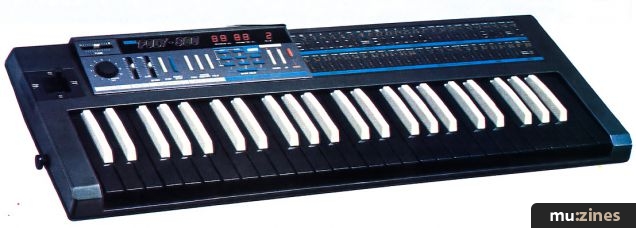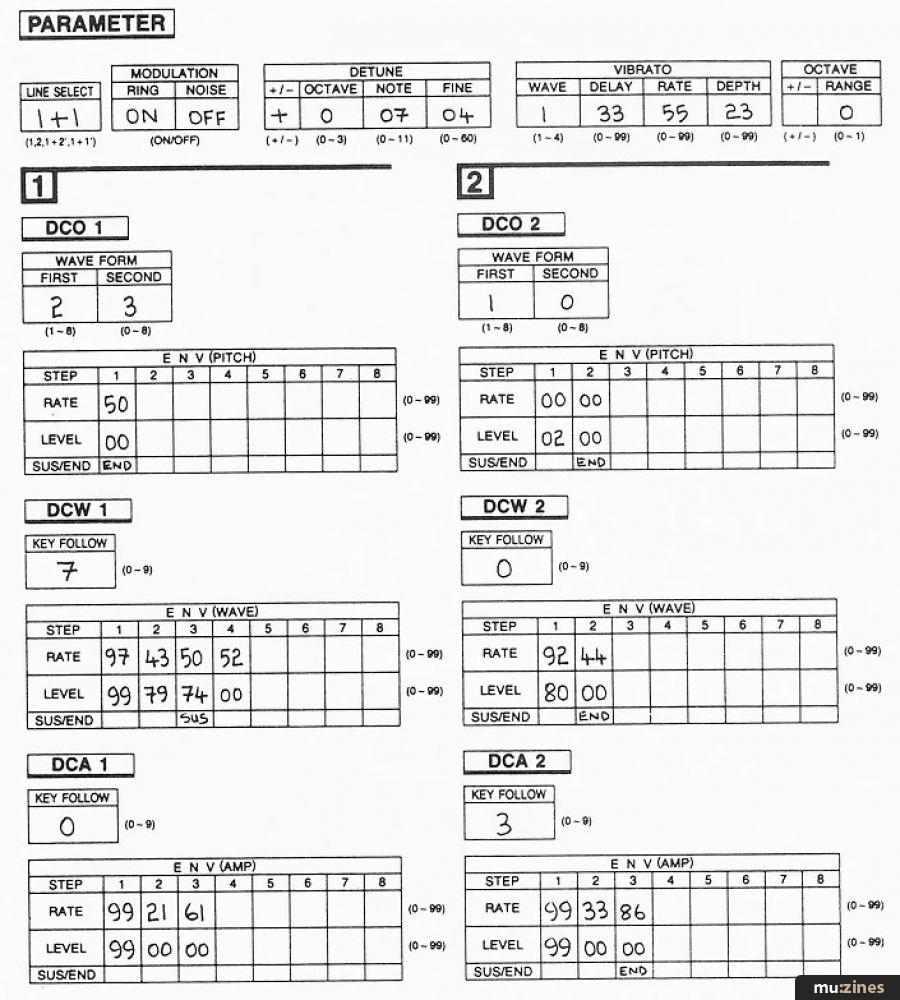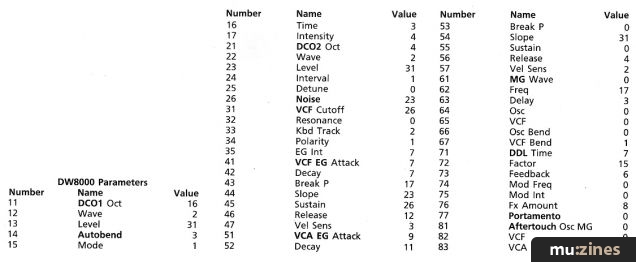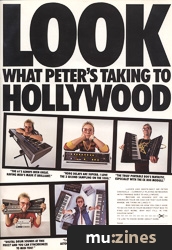Magazine Archive
Home -> Magazines -> Issues -> Articles in this issue -> View
Article Group: | |
Back to Back | |
YesArticle from International Musician & Recording World, February 1986 | |
TONY KAYE ON KORG

Yes are back with Trevor Horn producing the second album since the band reformed with Tony Kaye and Trevor Rabin. Playback caught up with them in Trevor Horn's studio in London and spoke to Tony Kaye about the album and keyboards. This is what he said:-
"I started using the Korg DW8000 in Hollywood in August when we took over a house there for rehearsals. I think it was the first one to reach the USA. Of course I'd been using the DW6000 for a while and was very impressed with that, but the 8000 is fantastic.
"I've used Korg personally on the road for a long time and, after the last album, we were on the road for a year and a half. I used a huge rig with Oberheims, some DX's and a couple of Emulators and more - and of course it's all good once it's all programmed up - if it's programmed well it's a great sound but it is very difficult to change quickly.
"At the moment I'm using the Korgs on their own - when I first got the DW8000 I midi'd it to a couple of DX's when we were rehearsing just to get some different sounds, but actually I found that it wasn't really necessary because there's some great digital sounds on the 8000 anyway - it has its own characteristic sounds which, in my opinion, are very good.
When Trevor and I were doing the demos after rehearsals in Los Angeles that's how we started. We midi'd the 6000 and 8000 together and we did everything for the album on the Korgs. I got used to the instruments and they're very very easy to program. They're really — what do they say — user friendly, musician friendly.
"Actually for most people the original sounds on the 8000 are so good it's just a matter of taste on how you change them. Of course the built-in digital delay is pretty extensive.
"This kind of quality equipment wasn't really available a year ago and at that time all you could use to produce these sounds was a load of DX's midi'd together or you could use Fairlights, or the Synclavier all in the pursuit of different sounds.
"I get more of a kick out of using the DW8000 as opposed to using the really expensive set-ups. When you get to the Synclavier level, I certainly don't know how to program it quickly - I don't think that there are that many people who do.
"For example, when we're doing back tracks, things are not finalised by any means and I've found that using the 8000 and 6000 together I can change a sound very quickly. Say we put a track down - even for a guide. I can in minutes change sounds, find different combinations of sound and change it myself between takes. I can't do that with the other systems - so for me it's ideal because I can do it myself very very quickly.
"We wanted to do something different from the old Yes, and with myself coming back into the band, and Trevor Rabin joining, we wanted to sound like Yes, but to get away from the old Yes material, and this album is an extension of that. The writing has been a very joint venture - everyone has participated. On the last album we took a lot of Trevor Rabin's songs and adapted them - he's a very good song writer.
STOP PRESS...
In fact the whole band is using Korg because everyone has their own set up at home for writing.
"I'm glad they're bringing out rack mount modules because my old set up was a pain in the neck to carry around. I'm banking on using a system with EX8000's on the road next year..."
JULIAN COLBECK ON KORG 'EXPANDERS'

The Korg EX-800 Expander
It's taken time, but I think it's fair to say that MIDI has finally sunken into the consciousness of, and become part of everyday life for most reasonably adept keyboard-orientated musicians.
MIDI's opening scenario was one of feverish excitement and bitter frustration as people desperately tried to fly before they (and more importantly, the manufacturers) could walk. Everyone knew that MIDI was going to vastly enhance the quality of our lives, but actually grilled as to what precisely one could accomplish via this innocent acronym, faces began to blank and feet shuffled.
As soon as inter-manufactural MIDIscrepancies were sorted out, and it was safe to assume that you could play any MIDI-based Korg synth but could hear both the Korg and a MIDI-linked synth of any make, it doesn't take an Einstein to figure out that some pretty unnecessary duplication of instrument hardware was going on: Namely the keyboard itself.
Whatever your set-up, the fact remains that you only have one pair of hands — and can then only play, at maximum, two keyboards at the same time.
Ultimately the beauty of expanders lies in their practicality — physically and financially. To be fair you are unlikely to be able to accomplish any more with a bunch of Korg EX-800s than you could with a bunch of Poly-800s; it's their size, shape, and price that open doors.
Let's explore the possibilities more fully.
ON STAGE
To perform at your best on stage you need to be unfettered by worries about equipment. Into this category of potential impediments come amplification and the ability to hear what you're playing; positioning of equipment so that you can play what you want, when you want, and can both see and can be seen; and finally the feel and response of your instrument. Expanders help considerably in all these areas.
The prime reason here is one of size. Using one or more expanders instead of full-blown instruments there is no need to be surrounded by banks of keyboards - taking up space and interrupting lines of vision/guzzling cash in terms of high-powered fancy stands. Korg Expander(s) can be racked neatly to one side, their sounds tapped and/or layered with others merely by changing MIDI channel numbers on your master, controlling keyboard.
Most of us have a favourite keyboard, ie, one that we're used to in terms of feel, depth, whatever. Using one, suitable keyboard on which to play, and hooking up to expanders so alleviates the need, physically to change instruments.

The Korg EX-8000 Expander
IN THE STUDIO
The two golden rules of session playing are: Be quick - Be versatile. By the second I don't mean that you need to be able to play ragtime, jazz, AOR, classical, and 'modern' all with equal aplomb, but that you need to have at your fingertips - alternatives, different sounds, different textures. Most working players find that one, main instrument plus a bag-full of expanders is the most cost-effective, labour-saving method of remaining in employment.
The instrument that you're most happy to play on can so remain permanently set up, linked to expanders (also permanently set up), and you can then quickly and easily experiment with combinations or solo contributions from a number of instruments without having to heave in last-resort back-ups from the car.
AT HOME
The above comments apply equally well to the home user of course, but expanders are especially welcome due to their reduced size and cost compared to their keyboard-ed counterparts.
The arrival of low-cost, powerful MIDI sequencers, like Korg's SQD-1 has further helped musicians with reducing recording costs (even for the humblest demo) since parts can be tried out - even mastered - at home. The same applies to sounds. But for a sequencer such as the SQD-1 to function at its best, you'll need to hook up a number of sound sources — Synthesisers? Yes, but expanders ideally. Especially when a sequencer is going to be doing the 'playing', umpteen different keyboards are an absurd waste of money.
FOR NON-MUSICIANS
Well, not exactly, let's say non-players. The steady growth of the computer musician has, and will continue to be one of the most important developments to guide music technology for years to come.
The interest in using personal computers to record and edit musical data is vast. However since much of the currently available musical software relies upon data being input from the computer keyboard, as opposed to the musical keyboard, the latter has become an often unnecessary item.
What is needed is simply a library of raw material for producing sounds. An expander in other words. Via a MIDI Computer interface (of which there are countless) music software and expander-type hardware opens the door to many a 'musician' in the best sense of the word, whose fingers may be as nimble and dextrous as their brain
WHAT IS ON OFFER FROM KORG
Korg's price-shattering Poly-800 needs little introduction from me. Equipped with plenty of powerful sounds that totally belie its price and size, the Poly-800 remains a strong contender in the first time buyer market, some two years after its release.
The EX-800 was released at the end of 1984. Identical in terms of programming prowess and double-oscillator layering capabilities, the EX-800's attacky though still analog sounds make it an ideal foil to digital synths of all persuasion. This first Korg Expander has 8 voices, 64 program memory and a built-in 256-step polyphonic sequencer. Receiving any of the 16 MIDI channels, with options for receiving program change, pitch bend, modulation and volume over MIDI, you can buy two or three EX-800s for the sort of money you'd expect to pay for many a pukka, keyboard-ed synth nowadays.
The EX-8000 is a more sophisticated beast though. Korgs latest expander — it has 16 digital waveforms which provide both crisp digital and warm analog type sounds. The keyboard equivalent is of course the DW8000, Korg's intriguing new poly-synth that comes blessed with a number of Digital Delay parameters which can be part of the make-up of your programs. This unique capability is featured on the EX-8000 too. Since the EX-8000 can also be rack-mounted, the inclusion of a DDL is all the more advantageous.
As well as a plethora of switchable MIDI data like volume, pitch bend, modulation and program change, the EX-8000 will respond to keyboard dynamics from a so-blessed MIDI-linked keyboard. It even boasts a key window function allowing split keyboard set-ups.
One presumes, notwithstanding the current computer invasion into musical territories, that instruments with keyboards will remain a necessity for some while to come. However no other type of musical instrument straddles the two worlds of computers and good ole fashion plug-in-and-playing better than expanders.
The fact that Korg's pair of men for all seasons' come inexpensive too is just the icing on the cake.
More with this artist
Atlantic Crossing (Yes) |
Chris Squire (Yes) |
 Back to Back (Yes) |
The Yes Generation (Yes) |
More from related artists
Wakeman (Rick Wakeman) |
Steve Howe (Steve Howe) |
Rick Wakeman in 1984 (Rick Wakeman) |
Bruford In Crimson (Bill Bruford) |
Patrick Moraz (Patrick Moraz) |
Patrick Moraz (Patrick Moraz) |
Bill Bruford (Bill Bruford) |
Patrick Moraz (Patrick Moraz) |
The Six Lives of Rick Wakeman (Rick Wakeman) |
Strike That Chord (Bill Bruford) |
The Collector (Geoff Downes) |
More with this topic
Company Report - Trace Elliot |
Why Settle for Second Best? |
 On The Rack |
Review |
EP-50 - 76-Key MIDI Piano |
 Pianos You'll Feel At Home With |
 How To Do Tricks With Time |
JX-8P: A Player's Guide |
 Roland at Frankfurt |
It's Latin for Rhythm |
Mixed Double |
Company Report - Yamaha |
Browse by Topic:
Advertisement Feature
Also featuring gear in this article

Back to Back
(EMM Mar 86)
Born Again - Korg EX800
(ES Dec 84)
Korg EX800 Expander
(12T Sep 84)
Patchwork
(MT Feb 89)
Browse category: Synthesizer Module > Korg
Featuring related gear
Back to Back
(EMM Nov 85)

Back to Back
(IM Dec 85)
Brian Chatton on the Poly 800
(EMM Apr 84)
Customise (Part 1)
(ES Jul 85)
Here In Black & White - Korg DW8000 Polysynth
(EMM Nov 85)
Korg DW8000 - SynthCheck
(IM Feb 86)
Korg DW8000 Synth
(12T Sep 85)
Korg Poly 800 - Asia and the Poly 800
(12T Apr 84)
Korg Poly 800 II - Polyphonic synth
(MM May 86)
Korg Poly 800 Synthesiser
(EMM Feb 84)
Korg Poly-800 vs SCI Six-Traks
(ES Jun 84)
Second Time Around - Korg Poly 800II Polysynth
(EMM Apr 86)
Patchwork
(EMM Aug 84)
Patchwork
(EMM Oct 84)
Patchwork
(EMM Nov 84)
Patchwork
(EMM Mar 85)
Patchwork
(EMM Jun 85)
Patchwork
(EMM Apr 86)
Patchwork
(EMM Jun 86)
Patchwork
(EMM Aug 86)
Patchwork
(EMM Oct 86)
Patchwork
(MT Jan 87)
Patchwork
(MT Feb 87)
Patchwork
(MT May 87)
Patchwork
(MT Jun 87)
Patchwork
(MT Aug 87)
...and 13 more Patchwork articles... (Show these)
Program Notes
(MM Sep 86)
Program Notes
(MM Nov 87)
Browse category: Synthesizer > Korg
Publisher: International Musician & Recording World - Cover Publications Ltd, Northern & Shell Ltd.
The current copyright owner/s of this content may differ from the originally published copyright notice.
More details on copyright ownership...
Playback - Spring 86
Topic:
Advertisement Feature
Artist:
Yes
Role:
Band/Group
Related Artists:
Bill Bruford
Geoff Downes
Rick Wakeman
Patrick Moraz
Steve Howe
Gear in this article:
Synthesizer Module > Korg > EX800
Synthesizer Module > Korg > EX8000
Gear Tags:
Feature
Help Support The Things You Love
mu:zines is the result of thousands of hours of effort, and will require many thousands more going forward to reach our goals of getting all this content online.
If you value this resource, you can support this project - it really helps!
Donations for April 2024
Issues donated this month: 0
New issues that have been donated or scanned for us this month.
Funds donated this month: £7.00
All donations and support are gratefully appreciated - thank you.
Magazines Needed - Can You Help?
Do you have any of these magazine issues?
If so, and you can donate, lend or scan them to help complete our archive, please get in touch via the Contribute page - thanks!









































